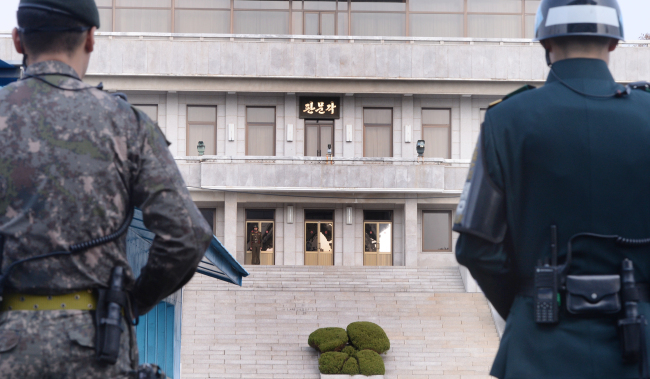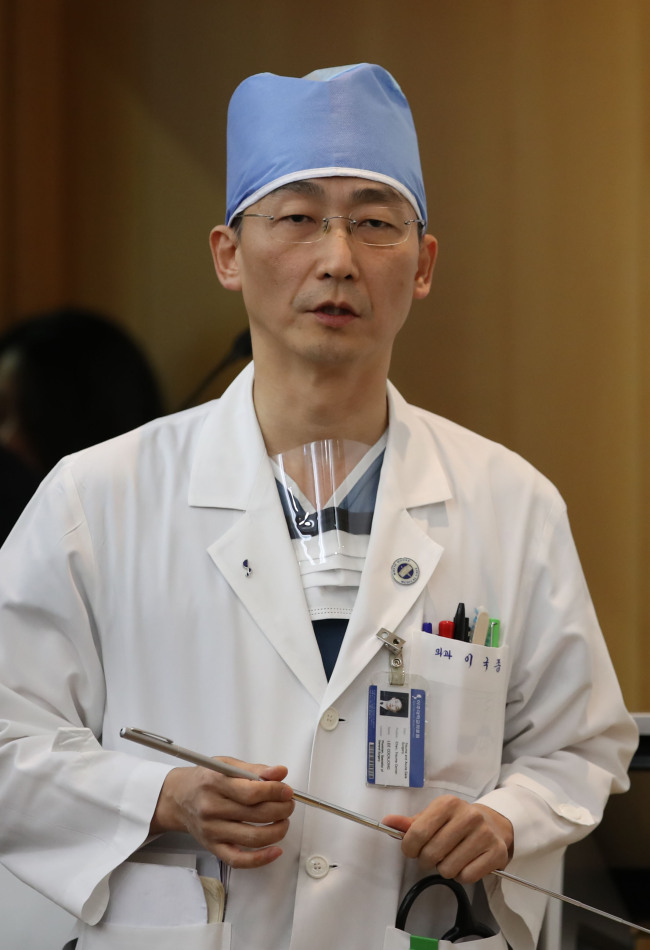[Newsmaker] Why did South Korea not return fire to NK chasing defected soldier?
By Yeo Jun-sukPublished : Nov. 15, 2017 - 16:45
With a North Korean solider remaining in critical condition from multiple gunshot wounds he suffered as he dashed across the border to defect, some South Koreans are questioning why the South Korean soldiers did not provide covering fire for him.
Four North Korean soldiers at the Joint Security Area inside the heavily fortified border zone fired about 40 rounds at the escaping solider. They shot southward. It is unclear whether they continued to shoot after the solider entered the South’s territory. South Korean soldiers rescued him only after the shooting ended.
The soldier, whose rank and identity have not been disclosed, underwent a second surgery Wednesday at a hospital south of Seoul. The surgery was “successful,” but he is still in a critical condition, according to doctor Lee Cook-jong, who performed the operation.
Military officials and analysts in Seoul said the military’s refrained response was the right move, given that the US commander assumes operational control in the JSA and any small-scale conflicts run the risk of escalating into an all-out war.
“I think our soldiers did a pretty good job,” South Korea’s Defense Minister Song Young-moo told lawmakers on Tuesday. “They made a good judgment call to minimize the risk and deal with the North Korean soldier appropriately.”
Four North Korean soldiers at the Joint Security Area inside the heavily fortified border zone fired about 40 rounds at the escaping solider. They shot southward. It is unclear whether they continued to shoot after the solider entered the South’s territory. South Korean soldiers rescued him only after the shooting ended.
The soldier, whose rank and identity have not been disclosed, underwent a second surgery Wednesday at a hospital south of Seoul. The surgery was “successful,” but he is still in a critical condition, according to doctor Lee Cook-jong, who performed the operation.
Military officials and analysts in Seoul said the military’s refrained response was the right move, given that the US commander assumes operational control in the JSA and any small-scale conflicts run the risk of escalating into an all-out war.
“I think our soldiers did a pretty good job,” South Korea’s Defense Minister Song Young-moo told lawmakers on Tuesday. “They made a good judgment call to minimize the risk and deal with the North Korean soldier appropriately.”

Located inside the 4-kilometer-wide Demilitarized Zone, the JSA is jointly overseen by the UN Command and by North Korea, with South Korean and North Korean border guards facing each other only meters apart.
Although the South Korean Army took over the duty of keeping security inside the JSA from the US in 2004, the authority over the use of force falls under UNC commander Gen. Vincent K. Brooks, who doubles as the commander of USFK and US-led Combined Forces Command.
Therefore, the South Korean soldiers inside the JSA are not allowed to use military force unless their action is justified under UNC rules of engagement applied to JSA, according to South Korea’s Joint Chiefs of Staff.
“The UNC commander considers two parts to determine whether such a response is appropriate: whether there is a direct threat to our guards and whether our response would escalate the situation,” JCS chief director of operations Gen. Suh Wook told lawmakers on Wednesday.
Apart from UNC’s general rules of engagement, there is a separate rule of engagement applied to JSA, an UNC official said. Although specific information is classified, the rule focuses more on maintaining armistice condition than detailing military response to North Korea’s possible provocations, the official said.
Some military officials here suggested South Korean armed forces’ own rule of engagement should be applied to the JSA, as they have assumed the major role of protecting the jointly controlled area for more than 10 years.
The unit in charge of maintaining the security of the JSA is United Nations Command Security Battalion of Joint Security Area. US lieutenant colonel serves as its commander, while South Korea’s lieutenant colonel serves as his deputy.
The South Korean Army would consult with the US to apply the South Korean Army’s rules of engagement “in a flexible manner,” so that the Korean JSA battalion commander can take appropriate measures to North Korea’s military threat, an anonymous military official told Yonhap News Agency.
“We’re going to consult with the UNC to allow South Korea to return fire immediately when there is a gunshot from North Korea and there is a sign that a North Korean solider would bring harm to our forces,” the official said.

Faced with the controversy, the UNC said it would release surveillance camera footage on Thursday to determine whether North Korean bullets were flown into the UNC-controlled area and whether the chasing soldiers crossed Military Demarcation Line, de facto border between the two Koreas.
If the North Korean soldiers were found to have crossed MDL and fire shots even after the fleeing solider crossed the border line, it would be a violation of armistice agreement between North Korea and the UNC, military officials said.
Meanwhile, doctor Lee, who performed the three-and-a-half-hour surgery on the wounded soldier, said although the surgery was successful, the soldier is still in a “critical condition.” The second surgery started at 9:30 a.m.
“Given the fact that the soldier was in shock for a long period of time from massive bleeding, we could see more serious complications than average patients. It’s a quite delicate situation,” the doctor said in a press briefing.
The doctor also told the reporters that the soldier’s intestine was infected by dozens of “parasites,” which he said had thrived before the soldier was wounded from the gunshot. Some of them are as long as 27 centimeters, he added.
By Yeo Jun-suk (jasonyeo@heraldcorp.com)






![[KH Explains] How should Korea adjust its trade defenses against Chinese EVs?](http://res.heraldm.com/phpwas/restmb_idxmake.php?idx=644&simg=/content/image/2024/04/15/20240415050562_0.jpg&u=20240415144419)











![[Today’s K-pop] Stray Kids to return soon: report](http://res.heraldm.com/phpwas/restmb_idxmake.php?idx=642&simg=/content/image/2024/04/16/20240416050713_0.jpg&u=)